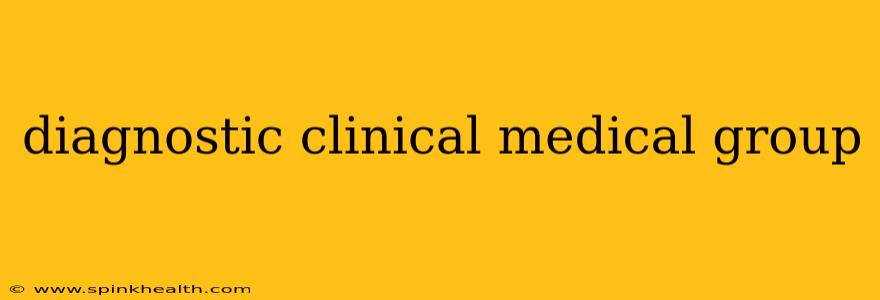The world of healthcare can feel overwhelming. Finding the right doctor, understanding diagnoses, and navigating the complexities of medical billing can all be daunting tasks. This is where diagnostic clinical medical groups play a crucial role. But what exactly are they? And how can they help you? Let's unravel the mystery together.
Imagine a bustling city, a complex network of roads and intersections. Each road represents a medical specialty, each intersection a point of collaboration. That's essentially what a diagnostic clinical medical group is – a carefully orchestrated network of specialists working together to provide comprehensive diagnostic services. They’re not your typical one-doctor office; they're a collaborative team approach to healthcare.
What is a Diagnostic Clinical Medical Group?
A diagnostic clinical medical group is a collection of healthcare professionals specializing in various diagnostic procedures and consultations. Instead of seeing multiple doctors individually, you can often receive coordinated care under one umbrella. This integrated approach ensures a holistic understanding of your health, leading to faster, more accurate diagnoses and ultimately, better treatment plans.
These groups often house specialists such as:
- Radiologists: Interpreting medical images like X-rays, CT scans, and MRIs.
- Pathologists: Examining tissue samples to identify diseases.
- Cardiologists: Diagnosing and treating heart conditions.
- Neurologists: Specializing in brain and nervous system disorders.
- Oncologists: Focusing on cancer diagnosis and treatment.
And many more, depending on the specific group's focus and size. The key is the collaborative nature – specialists share information, discuss cases, and work together to arrive at the most accurate and comprehensive diagnosis.
What Services Do Diagnostic Clinical Medical Groups Offer?
This is where the real power of these groups shines. Their services go far beyond simple check-ups. They offer a wide array of diagnostic testing and procedures, often including:
- Imaging services: X-rays, CT scans, MRIs, ultrasounds, PET scans.
- Laboratory testing: Blood tests, urine tests, tissue biopsies.
- Electrocardiograms (ECGs): Assessing heart function.
- EEG and EMG: Studying brain and muscle activity.
- Consultations: Expert opinions from multiple specialists.
How Do Diagnostic Clinical Medical Groups Improve Healthcare?
Several key benefits stem from the integrated nature of these groups:
- Faster Diagnosis: The collaborative approach often speeds up the diagnostic process, reducing the time it takes to receive a definitive diagnosis.
- Improved Accuracy: Multiple specialists reviewing your case increases the accuracy of diagnoses, minimizing the chances of missed or misdiagnosed conditions.
- Holistic Care: Considering all aspects of your health, not just isolated symptoms.
- Streamlined Communication: Doctors within the group communicate effectively, minimizing delays and confusion.
- Convenient Access: Often offering a range of services in one location.
What are the Differences Between Diagnostic Clinical Medical Groups and Other Healthcare Providers?
The key differentiator is the collaborative, multi-specialty approach. While other providers might offer individual diagnostic tests, these groups offer a complete package. Think of it like this: a general physician is like a family doctor, providing primary care. A diagnostic clinical medical group is more like a specialized diagnostic team working together for a single patient.
How Can I Find a Diagnostic Clinical Medical Group Near Me?
A simple online search for "diagnostic clinical medical groups near me" is a great starting point. You can also check your insurance provider's network to find in-network groups for convenient billing and coverage. Remember to check reviews and ratings to get a feel for the quality of care provided.
Choosing the Right Diagnostic Clinical Medical Group
Finding the right fit is crucial. Consider factors like:
- Specialties offered: Make sure the group covers the specific diagnostic needs you have.
- Insurance coverage: Verify if your insurance covers services at that group.
- Reputation and reviews: Look for groups with positive patient feedback and high ratings.
- Location and accessibility: Choose a group that's conveniently located and easy to reach.
The landscape of modern healthcare is evolving rapidly. Diagnostic clinical medical groups represent a significant advancement, providing patients with a more efficient, accurate, and holistic approach to diagnosis and treatment. By understanding their role and benefits, you can navigate the healthcare system with greater confidence and receive the best possible care.

